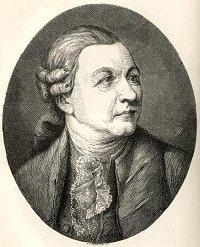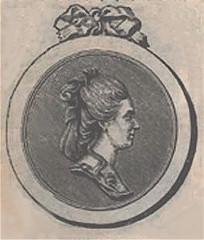
1724 - 1803 Person Name: Fred. Klopstock Hymnal Number: 632 Author of "Salig er de Døde, hine " in Salmebog for Lutherske Kristne i Amerika Klopstock, Friedrich Gottlieb, the eldest of the 17 children of Gottlob Heinrich Klopstock (then advocate and commissionsrath at Quedlinburg, and after 1735 amtmann at Friedeburg, on the Saale, near Halle), was born at Quedlinburg, July 2, 1724. From 1739 to 1745 he attended the famous school at Schulpforte, near Naumburg (where he conceived the first idea of his Messias); then he entered the University of Jena, in the autumn of 1745, as a student of theology, and the University of Leipzig at Easter, 1746. At Leipzig he made acquaintance with J. A. Cramer (q.v.); and became one of the contributors to the Bremer Beiträge, in which the first three books of his Messias appeared. In 1748 he became tutor in the house of a merchant named Weiss at Langensalza; and in 1750 accepted an invitation to visit Zurich (the literary capital of Switzerland), where his Messias had been received with great enthusiasm. He was then, in the spring of 1751, invited by the Danish prime minister, Count von Bernstorff, to take up his residence at the Court of King Frederick V., at Copenhagen, in order to be able to finish his Messias free from the cares of a profession; and was, in 1763, appointed Legationsrath. After the Count ceased, in the end of 1770, to be prime minister, Klopstock retired to Hamburg, in 1771, on a pension. The rest of his life was passed mainly at Hamburg, except about a year spent at Carlsruhe, at the Court of the Margave Carl Friedrich of Baden, who appointed him Hofrath. He d. at Hamburg, March 14, 1803, and was buried with civic honours on the 22nd, under a lime-tree in the churchyard at Ottensen (Koch, vi. 322; Allg. Deuteche Biog., xvi, 291, &c).
Klopstock ranks among the classic poets of Germany. In his Oden (collected at Hamburg, 1771; enlarged, Leipzig, 1798; finally enlarged, Leipzig, 1804) he is seen at his best; his earlier compositions of this class being the finest modern examples for perfection of form, lyric grace, majesty, and purity of rhythm. His most famous work is his Messias, which on its first appearance created an enthusiasm such as had not been awakened by any German work for centuries. It was suggested by Milton's Paradise Lost, but Milton's calm majesty, firmness of touch, and unity of action were all foreign to Klopstock's nature—his genius was lyric rather than epic. With all its defects of style and construction, it is still a noble work, and could only have been written by a true poet and a sincere Christian; though to us its interest perhaps consists as much in its historical importance and results as in its intrinsic merits. (Books 1-3 written in prose at Jena, and then in hexameter verse at Leipzig, and first pub. in the Neue Beyträge, Bremen, 1748. Books 1-3 revised, and 4, 5 added at Halle, 1751; 6-10 added in the Copenhagen ed., 1755; 11-15, Copenhagen, 1768; 16-20, Halle, 1773. Finally revised ed. in 4 vols., Leipzig, 1800.)
In his hymns Klopstock is not seen at his best. He seems to have had little apprecia¬tion of the requirements which the writer of hymns for use in public worship has to meet. His hymns are emotional and subjective, little suited to congregational tunes, and not sufficiently simple in style. In his first collection (1) Geistliche Lieder, Copenhagen, 1758, he included a number of indifferent recasts of earlier German hymns; his second collection (2) Geistliche Lieder, Copenhagen, 1769, consists entirely of original compositions. The only one of his hymns which is still much used in Germany is "Auferstehn, ja auferstehn, wirst du" (q.v.). The others which have passed into English common use are:—
i. Deine heilige Geburt. Supplication. In his Geistliche Lieder, 1758, p. 44, in 141, repeated in Knapp's Evangelischer Lieder-Schatz, 1837, No. 468. Translated as "Saviour! by Thy holy birth," by Dr. W. L. Alexander, in 2 stanzas of 8 lines. It was written about 1830, but 1st published in the 2nd ed., 1858, of his Selection of Hymns, No. 339, entitled "Christ's aid invoked."
ii. Herr, du wollst sie vollbereiten. Holy Communion. In his Geistliche Lieder, 1758, p. 135, arranged for antiphonal singing by choir and congregation. The form translated into English is "Herr, du wollst uns vorbereiten," being the first two stanzas for choir altered as No. 246 in the Württemberg Gesang-Buch, 1842, in 2 stanzas of 12 lines. Translated as "Grant us, Lord! due preparation," by L. Heyl, in the Ohio Lutheran Hymnal, 1880. Another tr. is, "O God, do Thou Thy folk prepare," by Dr. G. Walker, 1860, p. 64.
iii. Nicht nur streiten, überwinden. Christian Warfare. 1st pub. in the G. B. für St. Petri Kopenhagen, 1760, No, 639; repeated in his Geistliche Lieder, 1769, p. 23, in 5 stanzas of 8 lines, entitled "The Victory of the Faithful." In the Berlin Geistliche Leidersegen, ed. 1863. Translated as “Labour ever, late and early," a full but rather free tr. by Dr. Kennedy, in his Hymnologia Christiana, 1863.
iv, Zeige dich uns ohne Hülle. Sunday. In his Geistliche Lieder, 1769, p. 88, in 4 stanzas of 8 lines, entitled “Preparation for Divine Service." Included in the Berlin Geistliche Leidersegen, ed. 1863. It is the only hymn by Klopstock much used in English. Translated as "Lord, remove the veil away," a good and full tr. by Miss Borthwick,in Hymns from the Land of Luther, 3rd Ser., 1858, p. 47 (1884, p. 168). Included in full in Kennedy, 1863; Eng. Presbyterian Psalms & Hymns, 1867; Temple Hymn Book, 1867; Dale's English Hymn Book, 1875, and others. It is abridged in W. F. Stevenson's Hymns for Church & Home, 1873, Laudes Domini, N. Y., 1884, and others.
Hymns not in English common use:--
v. Ach wie hat mein Herz gerungen. Strength in Weakness. 1769, p. 101, in 10 stanzas, Translated as “Ah me, what woes this heart have wrung," by J. Sheppard, in his Foreign Sacred Lyre , 1857, p. 68.
vi. Du wollst erhoren Gott, ihr Flehn. For the Dying . 1758, p. 73, in 11 stanzas. The form translation is the recast (probably by J. S. Diterich), as No. 120, in the Berlin Gesang-Buch 1765, beginning "Dein sind wir Gott! in Ewigkeit." Translated as "We're Thine, O God, for evermore," by Dr. H. Mills, 1845 (1856, p. 241).
vii. Selig sind des Himmels Erben. For the Dying; or, At Funerals. 1758, p. 15, in 4 pts., arranged for choir and congregation, in all 10 stanzas. Founded on Rev. xiv. 13. Sung at the funeral of J. C. Lavater, January 4, 1801. Translated as "Blessed are the heirs of heaven," by G. Moultrie, in his Hymns & Lyrics, 1867, p. 337.
viii. Starke, die zu dieser Zeit. For the Dying , 1758, p. 1, in 3 stanzas. Translated as "Strengthen, Lord, the weary soul," by G. Moultrie, in his Hymns & Lyrics , 1867, p. 355, marked as an "orison for the departing spirit."
ix. Um Erden wandeln Monde. The Lord's Prayer. In his Oden, vol. ii., Leipzig, 1798, p. 119, marked as written in 1789, and entitled "Psalm." It is an ode of 58 lines, embodying and amplifying the Lord's Prayer. Sung at his own funeral. Translated as, (1) "Moons round their planets roll," by J. Sheppard, 1857, p. 46. (2) "Round their planets roll the moons," by Miss Winkworth, 1869, p. 332.
x. Wenn ich einst von jenem Schlummer. Morning. 1769, p. 57, in 3 stanzas. In the Württemberg Gesang-Buch, 1842, No. 562. The translations are, (1) "When I rise again to life," by W. Nind, in his Odes of Klopstock, 1848, p. 307. (2) "When I wake from out that slumber," in A. Baskerville's Poetry of Germany, 1854, p. 39, repeated in the Schaff-Gilman Library of Religious Poetry, ed. 1883, p. 282. (3) "Father, let no day to come" (the text used begins with stanza ii. altered to "Gieb dass keiner meiner Tage"), by J. Sheppard, 1857, p. 88. (4) "Since I one day from yonder sleeping," by Miss Warner, 1869, p. 40.
xi. Zitternd freu ich mich. The Vision of God. First published in the Nordische Aufselier ed. by J. A. Cramer, vol. ii. (Kopenhagen, 1760). In his Oden, Hamburg, 1771, p. 25, in 90 lines, and marked as written in 1759. Translated as, (1) "With trembling I rejoice," by W. Nind, 1848, p. 130. (2) "I joy, but tremblingly," by J. Sheppard, 1857, p. 24. (3) "Trembling I rejoice," by Miss Winkworth, 1869, p. 329.
Besides the above a considerable number of Klopstock's Oden are translated by J. Sheppard in his Foreign Sacred Lyre, 1857. A full selection from the Oden appeared as Odes of Klopstock from 1747 to 1780. Translated from the German by William Nind , London, W. Pickering, 1848. [Rev. James Mearns, M.A.]
--John Julian, Dictionary of Hymnology (1907)
Friedrich Gottlieb Klopstock

